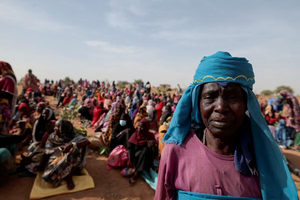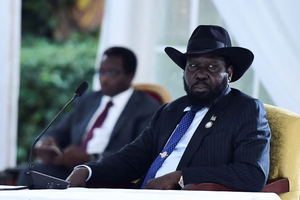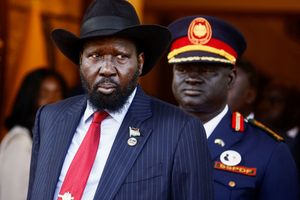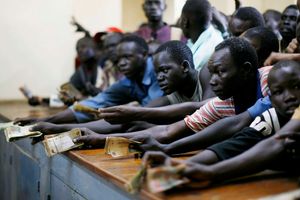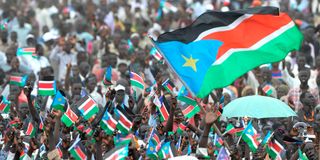
Thousands of Southern Sudanese wave the flag of their country during a past ceremony in the capital Juba
South Sudan President Salva Kiir is facing a tough task of reversing the economic downturn that has pushed more eight million people in the country into poverty as oil production, the nation’s chief revenue earner, tumbles due to internal and external factors, including depleted wells, flooding and military conflict in neighbouring Sudan.
Starved of donor funding for lack of political will to implement the 2018 peace agreement, Juba is trying to squeeze resources from an already overburdened oil sector.
South Sudan’s total debt at the end of March 2023 stood at $2.05 billion, of which 77 percent ($1.57 billion) were commercial loans, with bilateral and multilateral creditors contributing $117 million (six percent) and $349.66 million (17 percent) respectively, according to data from the Ministry of Finance.
Its risk of debt distress remains high owing, in large part, to the high debt service costs, and low levels of foreign exchange reserves and fiscal buffers, according to the IMF.
Total revenue for the 2023/2024 is projected to SSP1.83 trillion ($3 billion), of which oil revenue accounts for SSP1.53 trillion ($2.54 billion), non-oil revenue accounts for SSP245.3 billion ($407.2 million), and grants amount to SSP56.2 billion ($93.29 million).
President Kiir directed Petroleum minister, Puot Kang Chol, to increase oil production to help the country cope with the escalating economic challenges.
The President is banking on SSP1.53 trillion ($2.54 billion) from oil revenues to fund his budget for the 2023/2024 financial year, while hoping to growth GDP to 7.1 percent.
But Information minister Michael Makuei, the Government Spokesperson, concedes that the country is facing challenges in the oil sector.
Oil exports constitute about 29 percent of the value of the country’s GDP and are the main forex earner, and Juba’s worrying economic situation has been compounded by the falling price of crude on the global market.
The price of Brent, the international crude benchmark, has dropped by about 32 percent in the past 21 months to $82.96 per barrel on March 6, from a high of $122.71 per barrel in June 2022.
And now, the African Union has expressed concerns that the oil-dependence is driving the country to a possible crisis due to unmet needs, a situation that jeopardises the drive to peace and democracy.
This week, the African Union Peace and Security Council said Juba must diversity its economy to survive.
The Council met on February 17 to discuss South Sudan’s plan for elections and transition to a democracy. But a communique issued on Thursday said there was general worry around the sluggish economy hurting every political step.
It said it “encourages the R-TGoNU to implement the recommendations of the September 2023 Economic Conference, including diversification of the economy and promoting inclusive and sustainable growth and development in the country.”
R-TGoNU is the Revitalised Transitional Government of National Unity, a coalition arrangement between President Salva Kiir and leaders of various armed factions that signed a peace deal in 2018.
That deal provided for timelines under which Juba was to conduct elections. But they needed money. Most of those programmes, including establishing a mechanism for truth and justice, remain unfulfilled.
The Council said it also encourages “the R-TGoNU to continue to work closely with the AU Commission — Office of the Legal Counsel, in order to expedite the development of a roadmap for the establishment of the Hybrid Court of South Sudan while awaiting the ratification and implementation of the truth, reconciliation, compensation and reparation processes.”
Expensive external threats
The AU authorised Juba to tap the continental body’s existing military equipment base in Douala, Cameroon. The equipment will be airlifted to Juba to help the National Unified Forces.
South Sudan will still need to have an arms embargo imposed on it by the UN Security Council lifted. Yet, even if it were lifted, they would need money to buy weapons, and pay salaries to civil servants and the troops deployed to keep the peace.
Beyond the cost of peace and security, however, Juba is still going back to its oil wells for immediate cash needs, and stabilising its forex reserve position. So it has to squeeze resources from the oil fields.
Juba, in fact, already mortgaged its un-extracted oil to China two years ago until 2027, as payment to the Chinese to build roads. The new directive means increasing production to serve two needs: Paying debt and recurrent expenditure.
Minister Makuei has conceded that the flow of oil depends on the resolution of significant problems with oil pipelines, particularly repairs in regions under the control of the Sudanese forces.
Late last year, Juba denied claims that it was fighting extortion from the paramilitary Rapid Support Forces (RSF), who have been in combat with the Sudan Army for close to a year now. Yet it has been facing difficulty transporting oil to Port Sudan in the north, through the conflict-wracked areas.
The RSF are allegedly pressuring the South Sudan government to stop paying oil transport fees to the government in Khartoum. The RSF controls the Heglig pumping station (a major transit route to the Port of Sudan) and has threatened to shut it down if they do not receive the transport fees going forward.
In the 2022/2023 fiscal year, South Sudan’s transfers to Sudan for transit, transportation, and processing fees amounted to 6.3 million barrels. Unless both countries reach a compromise on these fees, Sudan will continue to take a large share of oil production, which reduces South Sudan’s share, which is essential to finance vital development expenditures.
In 2022, South Sudan paid Khartoum $148 million as a cost for oil processing, transportation and transit. Juba earned $1.4 billion in oil revenues, compared with $135 million in non-oil revenues.
According to Mr Makuei, the government and partners are exerting efforts to make sure that the war and flooding do not further disrupt oil output.
Both problems, however, are beyond the control of Juba.
Mr Chol announced that the government was reopening oil wells that had been submerged by recent floods. Some 239 wells owned by the Greater Pioneer Operating Company, the Sudd Petroleum Operating Company, and the Dar Petroleum Operating Company were damaged by flooding last year.
South Sudan’s oil production dropped to 140,000 barrels per day in 2023, from 160,000 in 2022. This is a far cry from the previous peak of 350,000 barrels per day before civil war broke out in 2013, and escalated in 2016.
Meanwhile, the treasury has been struggling to pay civil servants.
Even with initiatives to broaden its economic base, South Sudan still depends largely on oil earnings. The economy of the nation is greatly impacted by changes in the price of oil globally, leaving it susceptible to shocks from the outside world.
The government faces difficulty financing the 2023/24 budget due to a drop in oil production and the attacks on cargo ships by the Yemeni Houthi rebels in the Red Sea have caused a further challenge to transport and sale of the crude from South Sudan.
Last week, in a joint media briefing, Mr Makuei, Dr Elia Lomru and Governor of the Bank of South Sudan Dr James Alic Garang announced that the government was exploring the non-oil sector to sustain the economy.
Refugee burden
But minister Chol said while recovery in global oil prices has helped improve economic conditions, the country’s production is expected to drop.
“The recovery in global oil prices has helped improve economic conditions in South Sudan which, in turn, has given some fiscal space to adequately provide for government’s priority spending. However, oil production during 2023-2024 fiscal year is projected to be lower than in 2022-2023 fiscal year due to the depletion of some oil wells and the effects of floods,” Dr Chol says in the Budget Book for 2023/2024.
Four consecutive years of flooding and the impact from Russia’s war in Ukraine have aggravated an already difficult economic and humanitarian situation in the world’s newest nation grappling with a civil war that erupted in 2013 claiming the lives of about two million people and forcing about a quarter of the population to flee to neighbouring countries.
The war has stifled oil production in a country also hit hard by the Covid-19 pandemic in 2020.
The IMF expects crude oil price to decline to around $68 per barrel this year, compared with $100 per barrel in 2022 based on futures markets.
In October 2023, President Salva Kiir sacked Central Bank Governor Johnny Ohisa Damian and appointed his adviser to the IMF, Dr Garang, to help save the economy from collapse.
The conflict in Sudan has created logistical challenges, increased the cost of oil production, and exacerbated an already difficult humanitarian situation in South Sudan, with over 400,000 refugees having arrived in South Sudan by December 2023.
Economists at the UK-based Oxford Economics say South Sudan’s oil production faces more headwinds this year owing to the volatile political situation in Juba coupled with global oil prices that are expected to fall further.
“Both price and volume effects are expected to lower (South Sudan) oil export earnings in 2024, as well as decrease fiscal revenues. This will place further strain on public expenditure amidst a rising humanitarian aid crisis stemming from Sudanese refugees seeking a better life in South Sudan,” Theo Klein, an economist at the firm said in an interview.
Product shortages in Juba have come about due to cross-border trade disruptions and this will likely add pressure on consumer prices this year.
“We forecast inflation to average between 10 percent and 11 percent in 2024, up from 8 percent in 2023. Furthermore, reduced oil exports will lead to a decrease in foreign currency reserves. We forecast the pound to lose further value against the dollar in 2024, likely to average 1,107 in 2024, compared to 984 in 2023,” says Klein.
In 2023, the widening current account deficit led to a massive depreciation of the South Sudanese pound thereby raising the prices of imported goods at the same time that South Sudan’s import requirement remains high.
The IMF says continued progress on public financial management and governance reforms is essential to ensure healthy and inclusive growth and raise credibility with both the domestic and international investors.
These include increased oil-sector transparency, strengthening the debt management framework and expenditure controls, regular reporting on debt and fiscal operations, and determined steps to operationalise the AML/CFT framework.
Reporting by Aggrey Mutambo, James Anyanzwa and Fred Oluoch

